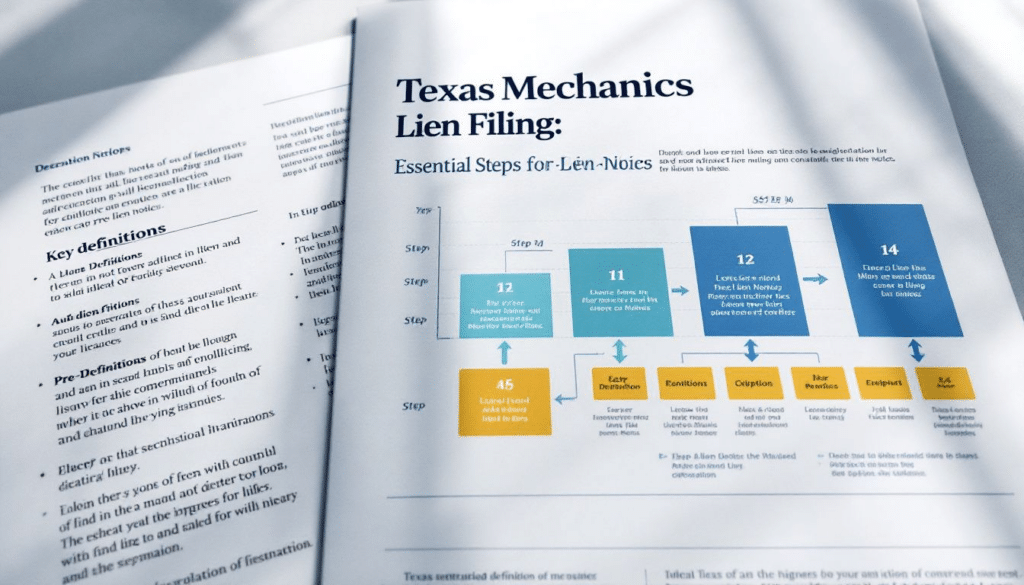Want to file a mechanics lien in Texas? This guide will take you through the necessary steps: determining eligibility, preparing pre-lien notices, and filing the lien affidavit. Secure your payment rights by following this clear, step-by-step process.
Key Takeaways
Eligibility to file a mechanics lien in Texas includes contractors, subcontractors, landscapers, design professionals, and demolition service providers, provided they comply with specific contractual agreements.
Pre-lien notices are essential for maintaining lien rights, with strict deadlines for submission depending on the party’s role in the construction process.
Filing a mechanics lien requires meticulous adherence to procedural steps, including accurate affidavit completion, timely notifications, and meeting established deadlines to ensure enforceability.
Understanding Eligibility for Filing a Mechanics Lien in Texas
A diverse range of professionals in Texas can safeguard their payment rights with mechanics liens. Contractors, subcontractors, landscapers, and design service providers are eligible to file liens under the Texas Property Code, ensuring payment for their contributions to construction projects. A mechanic’s lien in Texas helps protect these rights effectively under Texas lien law, in accordance with Texas mechanics lien laws.
Knowing who can file a mechanics lien is essential for protecting your rights. If you provide labor, materials, or design services for commercial or residential projects, you are eligible to file a lien in Texas.
Demolition service providers must have a written agreement with the property owner to file a mechanics lien. This inclusion ensures payments for those involved in structure removal, recognizing their contributions under the Texas Property Code.
Can Landscapers File a Mechanics Lien?
Landscapers often find themselves questioning whether their services are covered under Texas lien laws. The answer is a resounding yes. Landscapers can file a mechanics lien for their landscape services, ensuring they are paid for their labor and materials. This inclusion underscores the importance of every contribution to a property’s improvement, from the foundation to the final touches of greenery.
Landscapers can confidently undertake projects knowing they have a legal mechanism to secure payment. The process of filing a mechanics lien is the same for landscapers as for other professionals, ensuring equal protection under Texas law.
Rights of Demolition Service Providers
Demolition service providers play a critical role in preparing sites for new construction. In Texas, these professionals are eligible to file a mechanics lien if they provide labor or materials during the demolition of an improvement. This eligibility ensures that even the often-overlooked contributions of demolition services are recognized and protected.
Demolition contractors must have a written agreement with the property owner to file a mechanics lien. This solidifies their right to claim unpaid dues and secure payments for their services.
Design Professionals’ Lien Rights
Design professionals, including architects, engineers, and surveyors, have had their lien rights significantly bolstered since January 1, 2022. Under Texas lien laws, these professionals can file a mechanics lien if they have a signed contract with the property owner. This change acknowledges the critical role of design work in construction projects and ensures that unpaid fees for these services are recoverable.
Architects, engineers, and surveyors must have a written contract to file a mechanics lien. This legal backing allows them to confidently contribute to construction projects, ensuring unpaid dues can be claimed.
Pre-Lien Notices: Essential Steps

Pre-lien notices are vital in the Texas mechanics lien process, serving as formal warnings about unpaid labor or materials. Filing these notices strengthens the claimant’s ability to enforce lien rights if payments are delayed.
Preparing and filing a lien affidavit with specific details about the work and involved parties is necessary to secure a mechanics lien. The affidavit must include accurate information like the amount claimed, property description, and details about the owner and contractor.
Each role in a construction project has specific pre-lien notice requirements. Prime contractors, subcontractors, and material suppliers must follow these to ensure a valid lien claim.
Pre-Lien Notice Requirements for Prime Contractors
Prime contractors in Texas are generally exempt from the requirement to provide pre-lien notices on non-residential projects. This exemption reduces the administrative burden on prime contractors, allowing them to focus more on the project at hand. Recent legislative changes have further clarified that fabricators are also exempt from needing to submit pre-lien notices.
Although pre-lien notices are not required for prime contractors on non-residential projects, knowing when and where these notices are necessary is crucial for navigating Texas lien laws and protecting payment rights.
Subcontractors and Material Suppliers with Direct Contact
For first-tier subcontractors and material suppliers, sending pre-lien notices within a specific timeframe is essential to preserve their lien rights. These notices must be delivered within 15 days after the first day of work or delivery of materials. This timeline is critical, as failing to send pre-lien notices within the specified period can jeopardize a subcontractor’s or supplier’s lien rights.
Adhering to deadlines ensures subcontractors and material suppliers maintain valid lien claims. Timely action is crucial for securing payments for labor or materials furnished to a project.
Subcontractors and Material Suppliers Without Direct Contact
Subcontractors and material suppliers without direct contracts face additional challenges in maintaining their lien rights. These entities must notify both the property owners and general contractors to protect their lien claims. This step ensures that all parties are aware of the unpaid contributions, providing a clear path to secure payments.
For those without direct contractual relationships, notifying property owners and general contractors is essential. Clear communication and adherence to procedural requirements are vital in the mechanics lien process.
Consequences of Not Filing Preliminary Notices
Failing to file preliminary notices can have severe consequences for contractors and suppliers. Preliminary notices are crucial for maintaining lien rights in Texas, ensuring that claimants can collect payments owed for their work. Without these notices, lien rights can be lost, leaving contractors and suppliers without a legal mechanism to secure unpaid dues.
Subcontractors and material suppliers who fail to file preliminary notices risk losing their right to pursue a mechanics lien for unpaid labor or materials. Timely and accurate filing is crucial to maintaining the validity of a lien claim.
Filing a Mechanics Lien in Texas: Step-by-Step Process

Filing a mechanics lien in Texas involves a series of precise steps that must be followed to ensure the lien is valid. The process begins with filling out a specific affidavit, which needs to be recorded with the county clerk and then notifying the property owner and general contractor within five days. This step-by-step approach ensures that all legal requirements are met, and the lien is enforceable.
The affidavit must detail the work performed, amount claimed, and property description. This sworn statement is the formal claim for unpaid dues. After filing with the county clerk, notifying relevant parties within the stipulated timeframe is essential for maintaining lien rights.
Following each step in the filing process meticulously ensures lien claims are valid and enforceable, providing a robust mechanism to secure payments for work.
Recording the Affidavit of Lien
Filing the Affidavit of Lien in the county where the property improvement is located ensures the lien is properly recorded and enforceable. The completed affidavit must be submitted to the county recorder’s office with the applicable filing fee.
Including the legal description of the property in the lien affidavit ensures accurate documentation and enforceable claims for unpaid dues, which are legally sufficient. Following these procedures secures lien rights and protects financial interests.
Serving the Lien Affidavit
After recording the lien affidavit, it must be served to the property owner and general contractor within five days. This notice should be sent via certified mail with return receipt requested to document and verify the notification.
This step is vital to maintaining lien rights, as it formally notifies the involved parties of the filed lien. Adhering to these requirements ensures lien claims are valid and enforceable, providing a legal mechanism to secure unpaid dues.
Enforcing Your Mechanics Lien

Enforcing a mechanics lien is a critical step to ensure payment for work performed. Serving a preliminary notice is crucial for a mechanics lien to be valid, as it alerts involved parties about unpaid work. These notices act as reminders and help secure the right to file a lien if payment isn’t received.
If a mechanics lien claim is not paid, the claimant can initiate legal actions to enforce it, potentially leading to a foreclosure on the property. This step underscores the importance of adhering to all filing deadlines and requirements to maintain lien rights.
Importance of Timely Pre-Lien Notices
Timely pre-lien notices are crucial for asserting lien rights and ensuring claims are valid. Subcontractors and suppliers with direct contracts must send monthly notices to maintain their lien rights. Missing these deadlines can result in the loss of lien rights.
Sending pre-lien notices on time protects contractors’ and suppliers’ rights, ensuring their lien claims remain enforceable. This is a fundamental part of the mechanics lien process in Texas.
Correct Contract Signing for Homestead Properties
For homestead properties, sending lien paperwork to both the General Contractor and Property Owner is crucial. This ensures all parties are properly notified and lien rights are maintained.
Following specific guidelines for homestead properties is crucial to enforcing a mechanics lien. This helps claimants secure their payment rights and avoid potential legal issues.
Meeting Deadlines for Filing Affidavits
Meeting deadlines for filing lien affidavits is crucial to avoid complications and maintain lien rights. For residential projects, the affidavit must be filed with the county clerk by the 15th day of the third month after work completion. Missing this deadline may jeopardize lien rights.
Adhering to these deadlines ensures lien claims remain valid and enforceable, protecting payment rights and securing unpaid dues.
Accuracy in the Affidavit of Lien
Accuracy in the Affidavit of Lien is crucial. Correct and complete information is essential, as inaccuracies can lead to penalties or dismissal. Incorrect project details or contractor addresses can void the lien and expose the claimant to legal consequences.
Including precise information and following proper delivery and notarization protocols in the affidavit is critical. Meticulously verifying details before filing helps avoid errors and secures lien rights effectively.
Common Mistakes to Avoid When Filing a Mechanics Lien

Filing a mechanics lien involves several steps, and mistakes can jeopardize the process. Missing the filing deadline for the affidavit of lien can render it invalid. Keeping track of deadlines and ensuring timely filings is crucial.
Providing inaccurate information in the affidavit of lien form is another common error. Inaccuracies can lead to penalties and invalidation of the lien claim. Ensuring all details are correct and complete before filing helps avoid these pitfalls.
Failing to send necessary pre-lien notices or not adhering to required timelines can undermine lien rights. Understanding and avoiding these common mistakes ensures mechanics lien claims remain valid and enforceable.
Summary
Navigating the process of filing a mechanics lien in Texas requires a thorough understanding of the eligibility criteria, the importance of pre-lien notices, and the step-by-step procedures involved. By ensuring you meet all the requirements and avoid common mistakes, you can secure your payment rights and protect your financial interests.
From understanding who can file a mechanics lien to the critical steps of recording and serving the lien affidavit, each part of the process is essential. Enforcing your lien through timely notices and accurate filings ensures that your claims are valid and enforceable.
In conclusion, mastering the mechanics lien process in Texas empowers you to safeguard your payments and navigate the construction industry confidently. Use this guide as a roadmap to ensure you’re fully prepared to file and enforce your liens effectively.
Frequently Asked Questions
Who is eligible to file a mechanics lien in Texas?** **?
Only contractors, subcontractors, landscapers, demolition service providers, and design professionals like architects and engineers are eligible to file a mechanics lien in Texas, provided they have supplied labor, materials, or design services for a construction project.
What are pre-lien notices, and why are they important?** **?
Pre-lien notices are essential formal notifications to property owners and general contractors regarding unpaid work or materials, serving to protect lien rights for claimants. They are important as they ensure that those providing services or materials can enforce their liens if payments are not forthcoming.
What information must be included in the Affidavit of Lien?** **?
The Affidavit of Lien must include the amount claimed, a description of the property, and the details of the owner and contractor. Ensuring this information is accurate and complete is crucial for the validity of the lien.
What are the consequences of not filing pre-lien notices?** **?
Not filing pre-lien notices can lead to the forfeiture of lien rights, which means contractors and suppliers may struggle to collect unpaid dues. Adhering to the necessary timelines and procedures is crucial to protect these legal rights.
How soon must the lien affidavit be served after recording it?** **?
The lien affidavit must be served to the property owner and general contractor within five days of recording it, using certified mail with return receipt requested for proper documentation.


